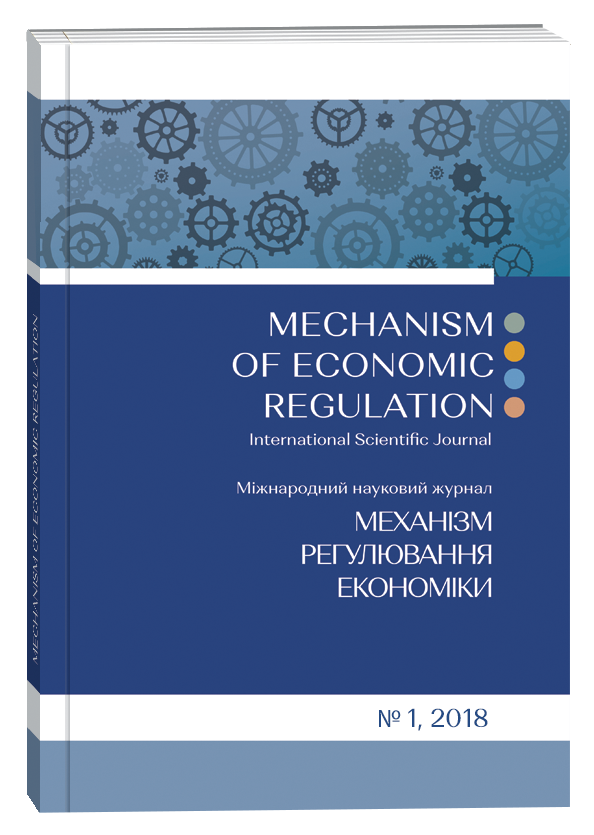EMPIRICAL LINKAGES BETWEEN MACROECONOMIC STABILITY AND DEMOCRACY
Abstract
The main goal of the paper is analysing the democracy impact on macroeconomic stability in Ukraine. In the paper the authors analysed the main approach to develop the economic and mathematical models, and factors which emphasises the correlation between macroeconomic stability and democracy. The authors highlighted that using of different methods to estimate level of democracy, which mostly relate from the theoretical approach to define the democracy and explanatory indicators which couldn’t explain the character, features and power of corresponding correlation. In the apparent, the empirical measures were proposed to make from the political regime which formed country’s political system point of view to achieve macroeconomic stability: monetary and fiscal system, openness economy. Accordingly, the main dependence indicators are growth rate of money supply, the fiscal balance to GDP, the trade openness as a sum of export and import to GDP. Besides, the authors used the dates of international rating as the explanatory indicators of country’s democracy. In the paper the authors’ theoretical hypothesis are approved by the findings.
References
WEF (2017). The Global Comhetitiveness Report. World Economic Forum, Geneva. Retrieved from http//www.weforum.org.
Strategy of Sustainable Development “Ukraine-2020”. (2015). Retrieved from http://zakon1.rada.gov.ua/laws/show/5/2015#n10.
Fenira, M. (2014). Democracy: A determinant factor in reducing inflation. International Journal of Economics and Financial Issues, 4(2), 363–375.
Doucouliagos, H., & Ulubaşoğlu, M. A. (2008). Democracy and economic growth: a meta- analysis. American Journal of Political Science, 52(1), 61–83.
Mobarak, A. M. (2005). Democracy, volatility, and economic development. Review of Economics and Statistics, 87(2), 348–361.
Satyanath, S., & Subramanian, A. (2007). The political economy of nominal macroeconomic pathologies. IMF Staff Papers, 54(3), 419–453.
Desai, R. M., Olofsgård, A., & Yousef, T. M. (2003). Democracy, inequality, and inflation. American Political Science Review, 97(3), 391–406.
Gasiorowski, M. J. (2000). Democracy and macroeconomic performance in underdeveloped countries: An empirical analysis. Comparative Political Studies, 33(3), 319–349.
Freedom House (2018a). Freedom in the World 2017. Retrieved from http://freedomhouse.org/report/freedom-world.
Freedom House (2018b). Nations in Transit 2018. Retrieved from https://freedomhouse.org/report/nations-transit/2018/ukraine.
Kekic, L. (2007). The Economist Intelligence Unit’s index of democracy. The Economist, 21, 1–11.
Andriichuk, T. (2012). Vymiriuvannia demokratii: teoretychni ta empirychni pidkhody [Measuring Democracy: Theoretical and Empirical Approaches]. Politychnyi menedzhment, 3, 3–11.
WGI (2017). The Worldwide Governance Indicators, World Bank. Retrieved from https://info.worldbank.org/governance/wgi.
Palii, O. V Ukraini zaraz demokratiia, ale z elementamy anarkhii. Radio svoboda [Ukraine is now a democracy, but with elements of anarchy. Radio Freedom]. (2018). Retrieved from https://www.radiosvoboda.org/a/29023795.html.
Parashchevin, M. A. (2016). Rezultaty natsionalnykh shchorichnykh monitorynhovykh opytuvan 1992–2016 [Results of national annual monitoring surveys]. Retrieved from http://i- soc.com.ua/assets/files/monitoring/dodatki2016.pdf.
The Economist Intelligence Unit's Democracy Index. (2017). Retrieved from https://infographics.economist.com.
Mijiyawa, A. (2008). Inflation and Democracy in Former Extractive Colonies Analysis with a New Instrumental Variable. Proceedings of the German Development Economics Conference. Zürich 2008, 28, 1–35.
World Bank (2017). World Development Indicators 2017. World Bank. Retrieved from https://data.worldbank.org/indicator.


